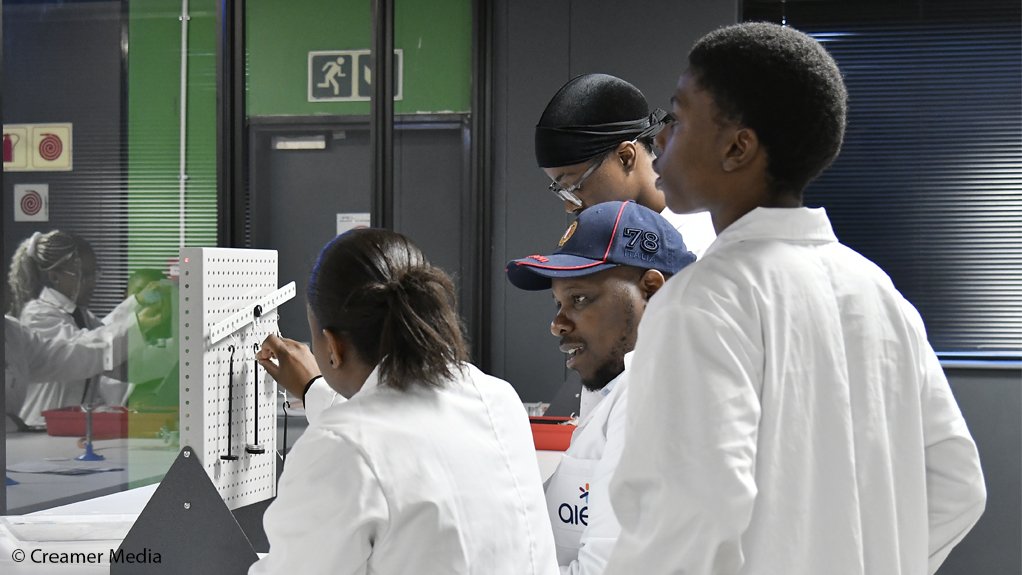A new era in engineering education, rebuilding the ladder
South Africa is at an inflection point in its engineering education landscape, with familiar pathways – technical and vocational education and training (TVET) colleges offering National Accredited Technical Education Diploma (NATED) programmes feeding into universities – being dismantled, says Academic Institute of Excellence (AIE) group CEO Leon Smalberger.
AIE is a multidisciplinary institution committed to transforming education in South Africa.
Although these familiar pathways have “never been easy or seamless” a new ecosystem is emerging – occupational qualifications under Quality Council for Trades and Occupations (QCTO). Private providers are stepping into roles previously reserved for public institutions, and intensifying pressure on finite university slots.
“For aspiring engineers, the journey is becoming more dynamic and more precarious. We are entering a new era in which we must reimagine the ladder from school to TVET to degree to professional registration. To succeed, every stakeholder – government, universities, private providers and industry – must focus on articulation, capacity and learner mobility.”
Shutting the Old Door
The Department of Higher Education and Training (DHET) has formally begun the phase-out of the NATED programmes (N4 to N6), states Smalberger, noting that a recent circular sets June 30, 2029, as the cutoff date for legacy NATED qualifications.
He adds that the logic is clear. NATED is no longer fit for purpose – being too theoretical, too removed from workplace realities and misaligned with modern industry needs.
“The shift to QCTO-based occupational qualifications brings necessary reform but also disruption: students in transition, colleges retooling, faculty reskilling and the risk of unequal recognition between legacy and new programmes.”
Gaps in continuity are a risk. If new occupational programmes are not rolled out in time, some learners may find themselves without a viable pathway.
Privatisation, Innovation and Disruption
“Into this breach steps AIE, among other institutions, poised to become private providers of professional engineering qualifications. AIE is tracking the DHET’s transition as part of its market positioning,” says Smalberger.
While AIE rolls out its strategy, the move into this space is a clear signal: private higher education providers see an opening.
This is transformative. It means that the monopoly of public universities over accredited engineering degrees is loosening. It also means competition for students, for faculty and for reputation.
“Private providers offer agility in curriculum design, tighter alignment to employer demands, modular delivery and potentially capacity to absorb students whom public universities cannot,” advances Smalberger.
But they carry responsibilities too. This involves meeting Engineering Council of South Africa (or analogous) accreditation, ensuring quality and that degrees from private providers are viewed as equivalent in industry and by graduate registration bodies.
Articulation is Fractured
One of the biggest barriers in South Africa’s current system is the transition from further education and training and/or TVET colleges into higher education, especially in engineering, emphasises Smalberger.
“Researchers have documented that although the National Qualifications Framework aspires to facilitate articulation, in practice mobility is weak.”
Some of the challenges include the mismatch in curricula, with TVET engineering programmes often emphasising applied skills and potentially lacking the theoretical depth expected of university engineering first years.
This is in addition to universities being reluctant to give full credit or exemptions for prior TVET work, many TVET entrants struggling to bridge higher education math and/or physics demands and universities unconsciously or consciously seeing TVET graduates as “second class” entrants, shares Smalberger.
He says the result is that many capable students must repeat foundational modules or start from zero, which costs time, money and morale.
“Private institutes such as AIE are in a better position to develop clear articulation paths and have done so successfully for TVET students for a few years, allowing credits to be scaled and used. But unless these bridges are strengthened, the ladder remains broken.”
The Bottleneck
Adding to all this strain is the capacity constraint of public engineering faculties.
“Public universities have fixed intake ceilings driven by infrastructure, funding, faculty headcount and accreditation constraints. Engineering disciplines are expensive, with labs, equipment, safety and regulatory compliance all raising the marginal cost per student. Demand is also high as thousands of learners annually qualify for entrance to engineering, but cannot be accommodated,” unpacks Smalberger.
Consequently, many eligible students are either turned away or placed in non- engineering degrees, derailing them or forcing them into suboptimal paths.
“This scarcity amplifies inequality – learners with means or connections access better-resourced institutions, while others are left behind. In this context, private providers have a strategic opportunity to provide ‘overflow capacity’, especially for those who miss out on public university slots,” concludes Smalberger.
Article Enquiry
Email Article
Save Article
Feedback
To advertise email advertising@creamermedia.co.za or click here
Announcements
What's On
Subscribe to improve your user experience...
Option 1 (equivalent of R125 a month):
Receive a weekly copy of Creamer Media's Engineering News & Mining Weekly magazine
(print copy for those in South Africa and e-magazine for those outside of South Africa)
Receive daily email newsletters
Access to full search results
Access archive of magazine back copies
Access to Projects in Progress
Access to ONE Research Report of your choice in PDF format
Option 2 (equivalent of R375 a month):
All benefits from Option 1
PLUS
Access to Creamer Media's Research Channel Africa for ALL Research Reports, in PDF format, on various industrial and mining sectors
including Electricity; Water; Energy Transition; Hydrogen; Roads, Rail and Ports; Coal; Gold; Platinum; Battery Metals; etc.
Already a subscriber?
Forgotten your password?
Receive weekly copy of Creamer Media's Engineering News & Mining Weekly magazine (print copy for those in South Africa and e-magazine for those outside of South Africa)
➕
Recieve daily email newsletters
➕
Access to full search results
➕
Access archive of magazine back copies
➕
Access to Projects in Progress
➕
Access to ONE Research Report of your choice in PDF format
RESEARCH CHANNEL AFRICA
R4500 (equivalent of R375 a month)
SUBSCRIBEAll benefits from Option 1
➕
Access to Creamer Media's Research Channel Africa for ALL Research Reports on various industrial and mining sectors, in PDF format, including on:
Electricity
➕
Water
➕
Energy Transition
➕
Hydrogen
➕
Roads, Rail and Ports
➕
Coal
➕
Gold
➕
Platinum
➕
Battery Metals
➕
etc.
Receive all benefits from Option 1 or Option 2 delivered to numerous people at your company
➕
Multiple User names and Passwords for simultaneous log-ins
➕
Intranet integration access to all in your organisation



















